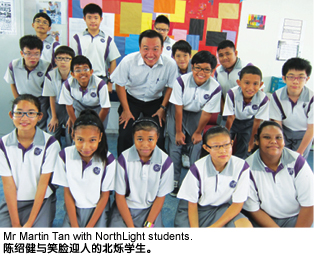
Before NorthLight School started in 2007, students who failed the Primary School Leaving Examination (PSLE) had to repeat it twice before they could enrol in one of the two Vocational Training Centres (VTCs) operated by the Institute of Technical Education (ITE).
This was because both Geylang Serai VTC and Assumption Vocational Institute only took in students aged 14 and over. The attrition rate at these two centres was also exceptionally high — 60 per cent of students did not finish the two-year programme.
There was clearly a need for the Ministry of Education (MOE) to plug the gap in the education system or risk students dropping out of school entirely. It was in response to this problem that NorthLight School was set up to give the less academically inclined students another chance at finding success in life. NorthLight students graduate with an ITE Skills Certificate (ISC) qualification in one of four areas — Mechanical Services, Facility Services, Retail Services and Food Preparation Services. Depending on how well they have done, they can choose to continue their education at an ITE, sign up for a traineeship programme or join the workforce.
This social innovation has given immense hope to these students by showing them that they can still be successful, lead a purposeful life and contribute positively to their community. More importantly, the School has been such a success that it has paved the way for three more specialised schools, and the closing of the two VTCs.
“The MOE’s confidence in setting up specialised schools grew after the initial success of our school,” said Mr Martin Tan, principal of NorthLight School.
Today, NorthLight School has approximately 830 students on roll, and takes in about 240 new students every year.
A Place for All Students
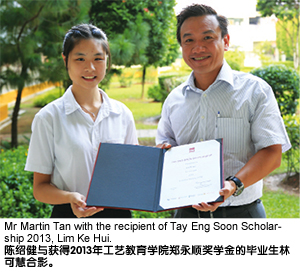 NorthLight School’s enrolment varies from year to year as it depends on the number of students who have failed the PSLE and who would like to apply to join the School. Its numbers have been steadily increasing as a result of a change in its admissions policy. In 2007, the School offered a 3-year programme for those who had failed the PSLE twice. However, in 2008, the School started to take in students who had failed the PSLE just once and they were admitted into a 4-year programme. NorthLight School’s enrolment varies from year to year as it depends on the number of students who have failed the PSLE and who would like to apply to join the School. Its numbers have been steadily increasing as a result of a change in its admissions policy. In 2007, the School offered a 3-year programme for those who had failed the PSLE twice. However, in 2008, the School started to take in students who had failed the PSLE just once and they were admitted into a 4-year programme.
“More students are joining us after they have failed the PSLE once. They now make up more than 50 per cent of our student population,” said Mr Tan.
Although NorthLight School has the capacity for 1,000 students, it hopes to keep its student population at an optimal size as it believes in giving each and every student adequate attention and care. The building of a similar specialised school, Assumption Pathway School, in 2009 has also helped the School to optimise its population.
But Mr Tan was also quick to emphasise that despite its focus on making sure that every student receives adequate attention, NorthLight School would not turn students away.
Mr Tan stressed, “To date, no student who failed PSLE has ever been denied a place in our school because we don’t believe in giving the child a double blow. Imagine a child who has not only failed the PSLE but is also rejected by our school. This would add to the disappointment. We make a conscious effort to ensure that there will always be enough places for those who want to join NorthLight. We are here to serve a purpose. Nobody will be turned away here.”
Successful Curriculum
For those who get into NorthLight School, many choose to stay — which in itself is an achievement given that dropout rates have been traditionally high for such schools. When the School was conceptualised, its target was to reduce the attrition rate from 60 per cent to 25 per cent. In NorthLight School, students are so motivated that the attrition rates of the graduating cohorts were 14 per cent in 2009 and only 10 per cent in 2011, outperforming the School’s initial target of 25 per cent.
Students feel a sense of belonging in NorthLight School. The hands-on pedagogy makes learning more interesting and they look forward to going to school.
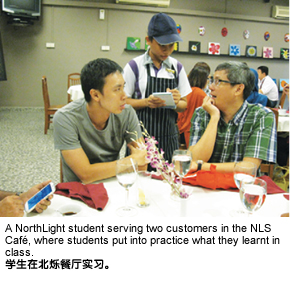 “We make our lessons authentic. There are opportunities for students to apply what they have learnt in class. We develop our own curriculum and teaching packages and have moved away from using textbooks. When students start to do well, teachers reward them with tokens like certificates and lollipops. We want students to experience the joy of learning. Though many are not strong in Maths, they begin to experience the learning of it in a different and meaningful way. It’s easier said than done but that’s how we try to do it here,” said Mr Tan. “We make our lessons authentic. There are opportunities for students to apply what they have learnt in class. We develop our own curriculum and teaching packages and have moved away from using textbooks. When students start to do well, teachers reward them with tokens like certificates and lollipops. We want students to experience the joy of learning. Though many are not strong in Maths, they begin to experience the learning of it in a different and meaningful way. It’s easier said than done but that’s how we try to do it here,” said Mr Tan.
With a focus on all-round character building, students do community work and service learning to acquire and apply values.
“Our students have plenty of opportunities to go for learning journeys and do community work. This is called ‘values in action’ and it is a critical part of our school programme. There are many different ways for them to give back to society. Some have made pineapple tarts for the residents staying in one-room flats at Circuit Road. This year, our students were also involved in the packing of goodie bags for the National Day Parade. We have even had a group of students who went to Chiangmai to help paint an orphanage,” said Mr Tan.
Because he believes that values can be learnt through the various co-curricular activities (CCAs), Mr Tan has placed a greater emphasis on these by having them conducted once a week on Friday mornings, instead of in the afternoon.
“I see great value in CCAs as they help to build character, but when they were held in the afternoon, students were often tired and would just go home. So we decided to have CCAs every Friday morning. When the students come to school, the first thing they do is take part in their CCAs. The attendance for the various CCAs shot up and students became much more enthusiastic about them,” explained Mr Tan.
He has even introduced new CCAs like BMX cycling.
“Such activities really excite the students. Our soccer team even went to Thailand for an exchange programme. Our teachers use CCAs as a vehicle to talk about values and teamwork so it’s a focal part of our curriculum,” he said.
Self-confidence is an important attribute and it is also one of the enhanced desired outcomes of education.
Mr Tan said, “The greatest thing we can do for these students is to help them believe in themselves. When they go out to work, they need to have self-confidence. If a student doesn’t believe in his abilities and has given up, he can’t achieve much. He can’t even learn. Through constant encouragement, these students start to believe in themselves again. They step forward to try new things. Their learning extends beyond the classroom; they try to be a better person. They try to live out the values that we teach them. They step forward and try everything. When a person tries, learning begins all over again. When they learn and experience success, they are encouraged to go further and it’s just like climbing a mountain. They will go higher with each step they take.
“I tell my students that others climb Mount Everest but they climb ‘Mount NorthLight’ and that it is not easy to reach the top of the mountain but it can be done. It becomes more difficult and dangerous as they climb higher and higher. They then have to be more focused. Some of them might mix with the wrong crowd as they get older so they have to keep their eye on the goal and not be distracted. I tell them that it’s just like climbing a real mountain. Towards the summit, the air gets thinner and they have to breathe harder and take each step slowly. When I tell them this, they are able to picture it. I always remind them not to fall off the mountain. By helping them to believe in themselves again, they can go on to do greater things in life. The School colours are purple and white. Purple is the colour of the sky when it is dark and white is the colour of the stars. The darker it gets, the brighter they shine.”
Creating a Supportive Environment
To climb a mountain, much support is required.
In order to create a supportive school environment, the teachers at NorthLight play a crucial role in helping their students to reach their goals. These are teachers who are willing to go the extra mile because they share the school’s vision and mission.
“I believe that having the heart to help these students is most important. We have a number of teachers who have experience working with students from challenging backgrounds and who have great pedagogical strategies to engage them. It is important that our teachers are versatile in their teaching. If a teacher has the passion and the belief to help such students, the rest can be learnt. I have teachers who have not had much experience but they are incredibly enthusiastic about helping such students and they pick things up very quickly,” said Mr Tan.
“When faced with setbacks, such teachers do not give up so easily because their desire to help these students is strong. A teacher with his heart in the right place is prepared for such setbacks as nothing is impossible.”
As such, NorthLight teachers are more than willing to take on difficult tasks. One such task is to instil emotional resilience in their students. This is necessary as some students might not take too well to the working world after leaving the sheltered walls of the school.
“It is a balancing act in terms of providing them with a nurturing environment and ensuring that they are emotionally resilient because they might meet with employers who are not so forgiving in the future. How do we then strike a balance? It’s a balance that we are continuously searching for because our students are all different. Some of them understand it and are able to differentiate between a school environment and a work environment, but some do not. That’s why it boils down to every teacher knowing every student as only then will the teacher know how much to give and how much to hold back,” said Mr Tan.
Teachers therefore spend time getting to know their students by having class family time with them every morning and having lunch with them every afternoon. Not surprisingly, students in NorthLight School are so close to the teachers that they naturally turn to them when they are in need.
“The security guards are stationed at the guard house 24/7 so that students who encounter problems and need a roof over their head for the night have a place to go. The School is the first place they think of and their teachers are the people they turn to. Helping these students is not as simple as making sure the lessons are interesting because they might not even turn up at school. Some of them are in such challenging circumstances that there is a need for us to help them address some of their family problems before they can start going to school regularly,” explained Mr Tan.
It is common for students to miss school because of their families’ financial situations.
“There are times when students can’t make it to school because they haven’t eaten a proper meal in days and there might not be anything in the fridge, so teachers will buy groceries for them and visit them at home. Some might not have enough money to take the bus to school so the School will provide the support and help them apply for a transit link card. There have also been cases where students can’t go to school because they have been sick for a few days and they can’t afford to see a doctor so they simply stay at home to rest in the hope that they will get well. Our teachers will then take these sick students to the clinic. Our teachers have to tackle such family issues to ensure that students can go to school. Sometimes it takes more than one home visit to achieve this,” said Mr Tan.
Why are the teachers willing to do so much for their students?
“Other than having the desire to help these students, it is also an act of paying forward. We help them and we want them to pay it forward and help others and I think that’s what our society needs more of if we want to have a kinder and a more gracious Singapore. Furthermore, when we help these students, we’re not only helping them because if we can lift them up, we are actually also helping their children to have a better life. So once you lift one up, there will be a positive impact down the line which will make a difference to their families. And I think that motivates the teachers.”
Lending a Hand to the Family
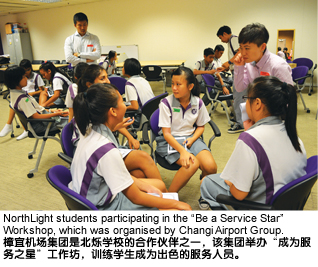 As parents are instrumental in the development of their children, NorthLight School also works closely with them. As parents are instrumental in the development of their children, NorthLight School also works closely with them.
Teachers keep in regular contact with parents by calling them regularly to inform them of their child’s progress and meeting them at the parent support group meetings. Teachers also update the School’s website and newsletter to notify parents about the various school events, which they are welcome to attend. There are also briefing sessions and even a family camp where both parents and child stay overnight in the School so as to encourage parents to be more involved in their child’s life.
However, it has not been easy to engage every single parent.
“Parents of those students who are struggling in school are sometimes not easy to contact and we want to reach out to them. It requires more effort. We want to reach out to all parents. As such, we have to think deeper about these parent engagement efforts, otherwise we will perpetuate the situation where the good get better and the weaker ones get left behind,” explained Mr Tan.
He let on that during his interview with the Board of NorthLight School, he was asked if there were certain practices that he wouldn’t implement in the school. To which he said, “I told them that I believe that good practices in education can be transplanted into different settings as they can be modified to suit the different school environments. However, in hindsight, I realise that helping these students requires more than good pedagogy. We need the help of the parents to help these students. And in NorthLight, sometimes, instead of parents helping us, we help them.”
To alleviate the family situation at home, NorthLight School works with both the Ministry of Culture, Community and Youth as well as the Ministry of Social and Family Development. It has also referred some families to the Family Service Centres (FSCs).
“Even if we help to pay for their food and electricity bills, it’d be a one-off thing. We can’t sustain that kind of support every month so the best way is to refer them to a FSC and then the social workers can help them sort out problems such as employment issues. We do that to help families so that students can go to school without any additional worries.”
Lifelong Care and Support
The care that NorthLight School gives to their students goes beyond their three or four years with the School. It does not stop even after they have graduated.
“We keep in touch with our alumni through social and recreational events. There are at least three to four of such events every year,” said Mr Tan.
“We have students who have gone on to polytechnics and they have received financial support from us as it can be quite costly.”
He gave the example of Paul Tan, who was featured in The Straits Times. He is currently pursuing a diploma in Aerospace at Republic Polytechnic after serving NS (National Service). Republic Polytechnic adopts a problem-based learning curriculum and he needed a laptop which would be quite costly, on top of the school fees for one semester. He came from a single-parent family.
“Where was he going to find the money?” Mr Tan asked. “If we don’t help our alumni, they might simply miss out on any educational opportunities that they have. They can give up, not go to a polytechnic and just work. Paul’s mentor is one of our board members and he heard about Paul’s situation, brought it to our attention and we helped him. We stay in touch with our alumni to ensure that their success is sustained.”
A number of NorthLight graduates choose to enter the workforce and they might need help looking for a job. That is where the School steps in again.
“We have employed a full-time staff member to help match our alumni to jobs. Before they graduate, we do a vocational assessment with them to see what their interests are and then get companies to interview them. We work with external agencies like Bizlink, which helps those who are disadvantaged to look for jobs. They are a great partner and we work closely with them. We try our best to secure the students a job before they graduate. We also help them to stay on in their jobs. Some of them need guidance and we provide them with it,” explained Mr Tan.
“It’s actually very much part of our mission — we want to help them with lifelong learning and employability. Even when they have a job, we still encourage them to continue learning through continual education training with the Workforce Development Agency.”
Partnering the Community
NorthLight School also recognises that the community can do its part to help these students and it works with more than 100 partners to effect this.
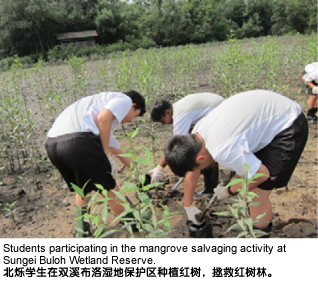 “Some of our partners are companies and some are individuals. Collectively, when they come together, they provide the resources which one can only dream of. They give us support and take care of certain needs like transport and meal allowances. Some have even given our students free spectacles. There’s a strong wave of CSR (Corporate Social Responsibility) in Singapore nowadays and companies are looking for worthy and meaningful partners to work with. Personally, I can see that the school mission resonates with all our partners and that’s why they come forward to help our students,” said Mr Tan. “Some of our partners are companies and some are individuals. Collectively, when they come together, they provide the resources which one can only dream of. They give us support and take care of certain needs like transport and meal allowances. Some have even given our students free spectacles. There’s a strong wave of CSR (Corporate Social Responsibility) in Singapore nowadays and companies are looking for worthy and meaningful partners to work with. Personally, I can see that the school mission resonates with all our partners and that’s why they come forward to help our students,” said Mr Tan.
Major accounting firm Deloitte has been an exemplary partner of the school.
“For the past two years, Deloitte has sponsored our students to go to places of interest like Universal Studios, Gardens by the Bay and River Safari. Not only do they sponsor us, their staff also take the day off to accompany our students on the outings. They mingle with the students and it’s a day to remember. Their staff have also joined us for our sports day. They were the timekeepers and some of them ran with our students.”
In addition, some partners of NorthLight School have not only given students the opportunity to do their industrial attachment with them but have also hired NorthLight graduates. One such partner is Home-Fix, a DIY company that has provided support since 2007.
“There was even one company who wanted to absorb all of my graduating students,” remarked Mr Tan.
NorthLight School is so appreciative of its partners that instead of having the usual Partners Appreciation Day at the end of the year, it will now merge this event with its Awards Day. The partners can then be there with both parents and students to see how the students have benefited from their help.
Transformed Students
With a successful curriculum and a supportive environment created by teachers, parents and partners alike, NorthLight students have gone on to achieve much success.
A case study on NorthLight School conducted by the Civil Service College in 2012 stated that almost all the employers in an annual school survey conducted since 2008 agreed that NorthLight interns exhibited positive values and performed well. Some students were also offered jobs at the end of their attachments and before graduation.
Furthermore, about 35 per cent of its students make it to an ITE, which is impressive in itself but even more so when it is set against the former VTCs’ 22 per cent rate.
However, Mr Tan acknowledges that not all students are able to enrol in a full-time programme in an ITE but every effort is then taken to help them to be meaningfully employed and continue their education upon graduation.
There are many definitions of success and these were discussed at one of the Our Singapore Conversation (OSC) sessions that was held in the School.
The OSC session was initiated by students from Raffles Institution and Hwa Chong Institution who were conducting public speaking lessons for the students in NorthLight School at the time and realised that these students also have views about community and social issues. The junior college students therefore contacted the OSC secretariat to set up a session in NorthLight.
During the OSC session, NorthLight students expressed their views on how they could contribute to society and their future. They spoke clearly and with great maturity about what success meant to them and several named their teachers. A student even went on to observe that attaining success for them would be easier if society were more inclusive.
Mr Tan said, with pride, “They were able to say those things because of the kind of love and care that they have received over time. They know that the School is a place that cares for them and that the teachers are genuine about helping them and are people they can turn to. They know that when they do things like horse-riding (to help with socio-emotional learning), their teachers and the School’s partners have worked together to plan and coordinate the lessons for them. Also, when the Year 3 students go overseas, they know that their teachers were the ones who helped them to get their passports and that the school paid for them. They know that their teachers really care for them and do not look down on them.
“More importantly, they know that the moment they enter NorthLight, they are in a safe haven because everyone is equal here and everyone treats them with respect, care and love, and they can be who they are and grow,” explained Mr Tan.
Learning from NorthLight
With the success it has achieved, NorthLight School has naturally become a shining example to many other schools that are looking at bettering their support systems for academically weaker students.
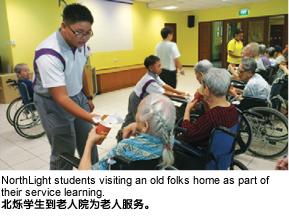 Teachers and allied educators from other schools have visited NorthLight to learn from the good practices and apply what they have learnt to their own schools. Teachers and allied educators from other schools have visited NorthLight to learn from the good practices and apply what they have learnt to their own schools.
“We host about 10 to 12 visits in a year for MOE teachers and allied educators,” said Mr Tan. “In addition, we have also conducted learning journeys for different groups like SAF (Singapore Armed Forces) officers, deputy secretaries and CEOs (Chief Executive Officers) of companies and corporations. The participants of the leadership and governance programme in the Civil Service College visit the School as we are one of their case studies on leadership and social interventions. We share a lot with others.”
NorthLight School has also received international guests who are not only impressed with what it has done but also with how Singapore takes care of the bottom 0.5 per cent of students in its education system.
“Most of them come from the S.E.A. (Southeast Asia) region such as Thailand and Brunei and they tell me that back home, they also have students of the same profile but there is lack of structural support. They feel our students are exceptionally lucky,” remarked Mr Tan.
Battling Stigma
Despite the success of NorthLight School, Mr Tan firmly believes that winning public confidence is a continuous journey.
“When the Princess of Thailand visited us, she asked me about the stigma that my students face. I responded that NorthLight School has overcome these challenges by helping the students to believe in themselves. But this is something that we need to continue to work at,” he warned.
“Many students who have just joined us might come in discouraged after failing the PSLE. Their parents also might not know much about the School and what we do here so we have to start building confidence in both students and parents all over again. From time to time, we also have to deal with students who misbehave outside the school and that results in public disapproval so we have to win people over. We have to continue what we are doing to stay true to our mission. Some Singaporeans might not even know that NorthLight School exists. Therefore, this journey of building the image of the school is a continuous one. It doesn’t end. We have to work on it consciously.”
In fact, Mr Tan feels that some Singaporeans might still be in the dark about the vast changes that have now taken place in the education sector and may still be biased.
“Some might still be trapped in the old mindset about what schools used to be like. And it’s sad when people have limited knowledge as they will form a negative perspective. I believe that even as society grows to be more inclusive, specialised schools will be the exception and not the norm. The majority of our schools will still be schools where students with different abilities come together, interact and integrate with one another,” said Mr Tan.
With time, the School has gained greater public support.
“Our students are the real ambassadors of NorthLight. The best judge of the school’s impact is how the students carry themselves. Stigma won’t go away so easily. People can say what they want but we need to stay focused on our mission and our students. We want them to be confident and believe that no matter what people say, they will not be affected but will go about life with a sense of purpose. So how do we educate them? We focus our efforts on where we have the greatest leverage and that is our students. When our students become confident and are proud of their school, they will carry themselves well, which will reflect well on us. If our students walk out of here hanging their heads, no matter what we do, we will never be able to overcome the stigma,” explained Mr Tan.
“The media has been a great help in helping the School to convey its mission. We also engage the community and work with our parents. Parents start to believe in NorthLight when they see their child excited about going to school, which is very different from how he or she used to feel. When parents are convinced, they will provide the support at home. This is critical because when the students graduate, their parents will be their primary influence.
“We will continue this noble mission of ours and when we celebrate our 10th anniversary in a few years’ time, it will be a great opportunity to share the celebration with our parents, partners and the community who have accompanied us on this journey.”
|